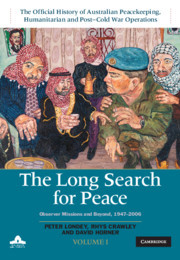The Long Search for Peace: Volume 1, The Official History of Australian Peacekeeping, Humanitarian and Post-Cold War Operations Observer Missions and Beyond, 1947–2006
Langue : Anglais
Auteurs : Londey Peter, Crawley Rhys, Horner David

Volume I of the Official History of Australian Peacekeeping, Humanitarian and Post-Cold War Operations recounts the Australian peacekeeping missions that began between 1947 and 1982, and follows them through to 2006, which is the end point of this series. The operations described in The Long Search for Peace - some long, some short; some successful, some not - represent a long period of learning and experimentation, and were a necessary apprenticeship for all that was to follow. Australia contributed peacekeepers to all major decolonisation efforts: for thirty-five years in Kashmir, fifty-three years in Cyprus, and (as of writing) sixty-one years in the Middle East, as well as shorter deployments in Indonesia, Korea and Rhodesia. This volume also describes some smaller-scale Australian missions in the Congo, West New Guinea, Yemen, Uganda and Lebanon. It brings to life Australia's long-term contribution not only to these operations but also to the very idea of peacekeeping.
Part I. Actor and Observer: the Early Cold War Years: 1. The origins of peacekeeping: Australia responds to the post-war world; 2. St George and the Maiden: Australian and the Indonesian question, 1945–1947; 3. Inventing peacekeeping: the United Nations in Indonesia, 1947–1948; 4. Failure: the United Nations in Indonesia, 1948; 5. Success: the United Nations in Indonesia, 1949–1951; 6. Observing at a critical moment: Australia and Korea, 1947–1953; 7. An intractable dispute: Australia and the Kashmir problem, 1947–1951; 8. 'Tough men wanted': Australian military observers in Kashmir, 1951–1971; 9. Australia and the problem of Palestine: peacekeeping in the Middle East, 1947–1967; 10. The Six-Day War and after: Australians in the Middle East 1967–1973; 11. 'If you're not confused, you don't understand the situation': Australia responds to the Congo Crisis, 1960–1961; 12. Over jungle and swamp: Australian Army helicopters in West New Guinea, 1962–1963; 13. A reluctant start: the road to Cyprus, 1964; 14. The first decade: Australian police in Cyprus, 1964–1974; 15. Australia and the invention of peacekeeping; Part II. New Ambitions: the Later Cold War Years: 16. The new internationalists: peacekeeping after the Vietnam War, 1972–1987; 17. A 'lop-sided' umpire: Australian military observers in Kashmir, 1971–1985; 18. 'Snow Goose' and the 'Milk Run': RAAF transport support for UNMOGIP, 1975–1978; 19. An island divided: AUSTCIVPOL in Cyprus, 1974–1976; 20. Desert sortie: United Nations Emergency Force II, 1976–1979; 21. On the Golan: Australian military observers in Israel and Syria, 1973–1989; 22. Witnesses to civil war: Australian military observers in Lebanon, 1972–1989; 23. Fumbling the political football: multinational force and observers, 1982–1986; 24. The tribe that lost its head: finding a resolution in Rhodesia, 1979; 25. Into Africa: deploying the force to Rhodesia: 197901980; 26. A dangerous but crucial mission: monitoring in Rhodesia, 197901980; 27. The healing touch: Elections in Rhodesia, 1980; 28. 'The only show in town': Commonwealth Military Training Team – Uganda, 1982–1984; Part III. Carrying on: after the Cold War; 29. A sustained commitment: AUSTCIVPOL in Cyprus, 1974–2006; 30. Uprisings and wars: Australians in UNTSO, 1990–2005; 31. Service in the Sinai: Australia and the MFO, 1993–2006; 32. In the midst of war: Australians in Lebanon, 2006.
Peter Londey has taught in Classics at the Australian National University and worked as a senior historian at the Australian War Memorial. At the Memorial he wrote the first history of Australian peacekeeping, Other Peoples' Wars (2004).
David Horner is Emeritus Professor in the Strategic and Defence Studies Centre at the Australian National University, where he was previously Professor of Australian Defence History. He is the Official Historian of Australian Peacekeeping, Humanitarian and Post-Cold War Operations.
Rhys Crawley is an historian at the Australian War Memorial, a Visiting Fellow at the Australian National University, and an adjunct lecturer at the University of New South Wales, Canberra.
David Horner is Emeritus Professor in the Strategic and Defence Studies Centre at the Australian National University, where he was previously Professor of Australian Defence History. He is the Official Historian of Australian Peacekeeping, Humanitarian and Post-Cold War Operations.
Rhys Crawley is an historian at the Australian War Memorial, a Visiting Fellow at the Australian National University, and an adjunct lecturer at the University of New South Wales, Canberra.
Date de parution : 10-2019
Ouvrage de 940 p.
17.6x25.2 cm
Disponible chez l'éditeur (délai d'approvisionnement : 14 jours).
Prix indicatif 143,80 €
Ajouter au panierThème de The Long Search for Peace: Volume 1, The Official... :
© 2024 LAVOISIER S.A.S.



